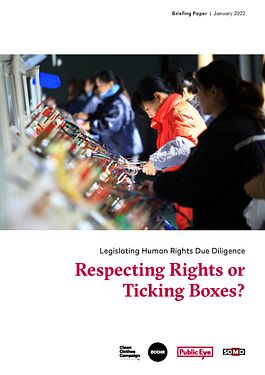Respecting Rights or Ticking Boxes?
Report Clean Clothes Campaign, ECCHR, Public Eye, SOMO, 2022
Momentum to enact mandatory human rights due diligence (HRDD) legislation is building around the world. Such legislation is necessary to ensure corporations respect human rights and that victims of corporate abuse have access to justice and remedy. As a result, legislators must determine how to turn the normative standards for HRDD contained in the UN Guiding Principles and OECD Guidelines into binding, hard-law obligations.
If lawmakers do not achieve the right balance between practical flexibility and normative rigidity, there is a significant risk that HRDD laws will become, at best, a paper tiger that yields no real positive impact for people and, at worst, a new greenwashing technique behind which businesses can hide while continuing to do harm.
In order to ensure this does not happen, this paper identifies 12 key interpretations of the norms that legislators must get right when establishing HRDD obligations.


